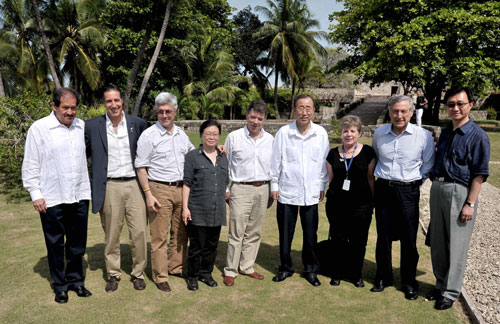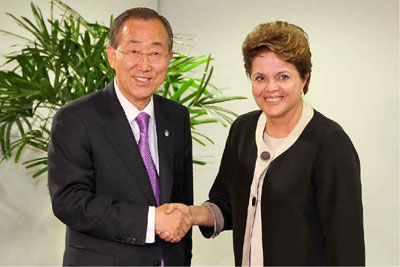Ban Ki-Moon Highlights Contribution of South American Countries to Key Issues on the Global Agenda
Topic(s)
Executive Secretary of ECLAC, Alicia Bárcena, is part of entourage accompanying the most senior United Nations representative.

(15 June 2011) During the first part of his South American tour, the United Nations Secretary-General, Ban Ki-moon, highlighted the region's progress in various areas such as the protection of human rights, transition to democracy and the fight against poverty, which he said can serve as examples to the whole world.
On Friday 10 June, Ki-moon began a tour of four South American countries (Colombia, Argentina, Uruguay and Brazil), accompanied by the Executive Secretary of the Economic Commission for Latin America and the Caribbean (ECLAC), Alicia Bárcena, United Nations Assistant Secretary-General for Humanitarian Affairs, Catherine Bragg, and Assistant Secretary-General for Political Affairs, Óscar Fernández-Taranco, as well as the Regional Director of the United Nations Development Programme (UNDP), Heraldo Muñoz.
In Colombia, where he stayed until midday on Sunday, the Secretary-General met with President Juan Manuel Santos, and they flew over the worst flood-affected areas where over 3 million people in the country have been affected.
The Secretary-General took part in the ceremony where President Santos signed the new law on Victims' Rights and Land Restitution, which will benefit those affected by the domestic armed conflict. He said: "This is an important step towards peace and reconciliation, justice and stability".
He also said that "Colombia is an important voice regionally and globally on so many issues: through its current membership of the Security Council, its leadership within UNASUR [the Union of South American Nations], and its growing interest in South-South cooperation".
On his trip to Argentina, the Secretary-General met with President Cristina Fernández and other national authorities. He visited the memorial and human rights space of the former Navy Mechanics School (ESMA), where the facilities were used for detention and torture during the last Argentine dictatorship (1976-1983).
Ban Ki-moon described Argentina as "setting an example for the world through your country's groundbreaking progress in tackling impunity for human rights violations". Argentina has also significantly reduced inequality since 2003.
The Secretary-General underlined the fact that "Argentina is serving very effectively as a bridge between G20 and G77 and China". "This means that Argentina is in a position to find consensus between diverse groups of countries on topics so crucial to our common 21st century global agenda. This includes the Millennium Development Goals, South-South cooperation, global economic governance, multilateral trade negotiations, climate change, and sustainable development".
In Uruguay Ban Ki-moon was welcomed by President José Mujica and Foreign Affairs Minister Luis Almagro.
The Secretary-General highlighted that "Adjusted for population, Uruguay is the world's number one contributor to United Nations peacekeeping operations. Now Uruguay is second largest troop contributor to MINUSTAH [United Nations Stabilization Mission in Haiti]".
He pointed out that "Uruguay's deepening of democracy and progress on human development is a true inspiration".
He also said "I will highlight your strong voice in the area of nuclear disarmament and non-proliferation" and "next week, Uruguay will assume the President of the Human Rights Council, which for the first time will have a female President", Uruguayan Ambassador, Laura Dupuy.
Uruguay is the region's most equal country and has the lowest levels of extreme poverty. As is the case in Argentina, Uruguay made considerable efforts during the crisis to protect employment and guarantee social security for the most vulnerable.
Colombia, Argentina and Uruguay supported the re-election of Ban Ki-moon for another five years at the helm of the United Nations.
The Secretary-General will end his South American tour in Brazil, where he will be welcomed by President Dilma Rousseff and other national authorities.
Any queries should be addressed to the ECLAC Public Information and Web Services Section. E-mail: dpisantiago@cepal.org; Tel.: (56 2) 210 2040.
Related content

Ban Ki-Moon Urged South America to Play an Even Greater Role in the United Nations
The Executive Secretary of ECLAC, Alicia Bárcena, was part of the delegation that accompanied the leader of the United Nations.
Country(ies)
-
Argentina
-
Brazil
-
Colombia
-
Uruguay